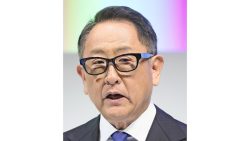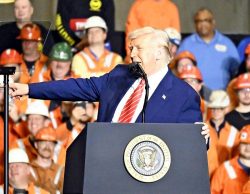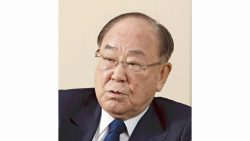16:29 JST, June 15, 2025
The Group of Seven advanced countries, which share values such as democracy and the rule of law, have taken the lead in shaping the international order. Disarray among the G7 countries could destabilize the world further.
It is important to end the aggression and fighting that is spreading around the world. To that end, the G7 members must first unite.
A G7 summit is scheduled to be held in Kananaskis, western Canada, from Sunday to Tuesday. This year, the group will mark 50 years since its first summit, at which the leaders of six countries — Japan, the United States and European nations — met in 1975. Canada was not included at that time.
Initially, the agenda was how to deal with economic crises, such as the oil shock and currency issues. At Japan’s suggestion, the G7 countries decided to hold a summit every year, and topics have widened from economic issues to also include politics and security.
Fifty years ago, the member countries collectively accounted for 60% of the global gross domestic product, but with the rise of China and other countries, the figure currently stands at 40%. After the collapse of Lehman Brothers, the Group of 20 major economies began to play an active role. Many people have noted the decline in the G7’s presence.
However, the G20, which includes China, Russia and India as members, often faces conflicting national interests, so it is an insufficient framework for resolving issues. With the U.N. Security Council also falling into disarray, the G7 must play a role in restoring world peace and stability.
A source of concern is the presence of U.S. President Donald Trump, who will be returning to the G7 summits.
At one point, Trump leaned toward Russia, which has continued its aggression against Ukraine. He was involved in ceasefire talks, but his attempt did not go as intended. Recently, he has begun to distance himself from the issue.
European and other countries have condemned Israel’s attacks that have caused many casualties in the Palestinian territory of the Gaza Strip, but the United States has continued to provide military support to Israel. In addition, Israel would not have been able to conduct airstrikes on Iran if the Trump administration had opposed them.
Although a rift has widened between the United States and European and other countries, it is unlikely to be possible to resolve various conflicts without the involvement of the United States, which has overwhelming military power.
Washington’s high tariff policy is also causing discord within the G7.
Canada, which currently holds the G7 presidency, reportedly intends to forgo issuing a leaders’ joint statement, which typically summarizes the outcomes of the summit, and instead plans to compile separate documents of agreement on individual issues such as the economy and security. This approach appears to be aimed at allowing the G7 countries to reach agreements as much as possible by seeking common ground with the United States on individual issues.
It is difficult to say that the administration of Prime Minister Shigeru Ishiba has been actively engaged with providing support to Ukraine and resolving conflicts in the Middle East. At the G7 summit, Ishiba should make clear Japan’s stance to contribute to restoring peace.
(From The Yomiuri Shimbun, June 15, 2025)
"Editorial & Columns" POPULAR ARTICLE
-

Mt. Fuji Eruption: Preparations Necessary for Widespread Ashfall
-

Nippon Steel’s Acquisition To Be Approved: Deal Should Be a Symbol of Japan-U.S. Economic Cooperation
-

Basic Economic, Fiscal Policy Draft: Deepen Strategy to Increase Take-home Pay
-

U.S. Tariffs Blocked: Can Judiciary Prevent The President from Abusing Power?
-

With Trump Back, Japan Must Expand Foreign Policy
JN ACCESS RANKING
-

Toyoda to Become Automobile Business Association of Japan Chairman; to Help Guide U.S. Tariff-Affected Industriessns
-

Visitors to Japan Hit Single-Month Record High in April
-

Japanese Researchers Develop ‘Transparent Paper’ as Alternative to Plastics; New Material Is Biodegradable, Can Be Produced with Low Carbon Emissions
-

Japan’s Core Inflation Hits More than 2-year High, Could Force Year-End BOJ Hike
-

Aichi Rice Production Under Siege from Warming Climate; Record Heat Stunts Crop Growth, Causes Greater Pest Activity




















